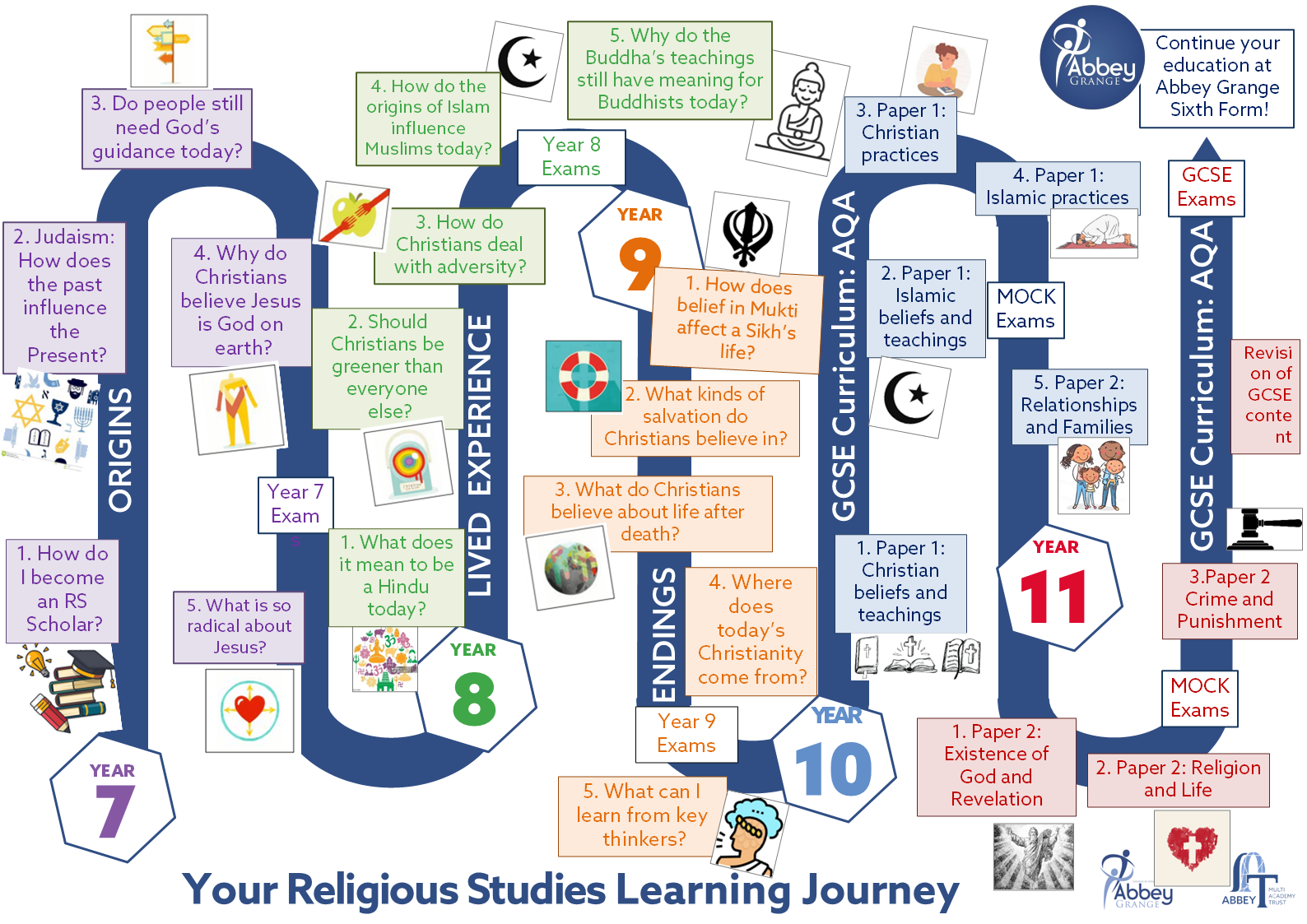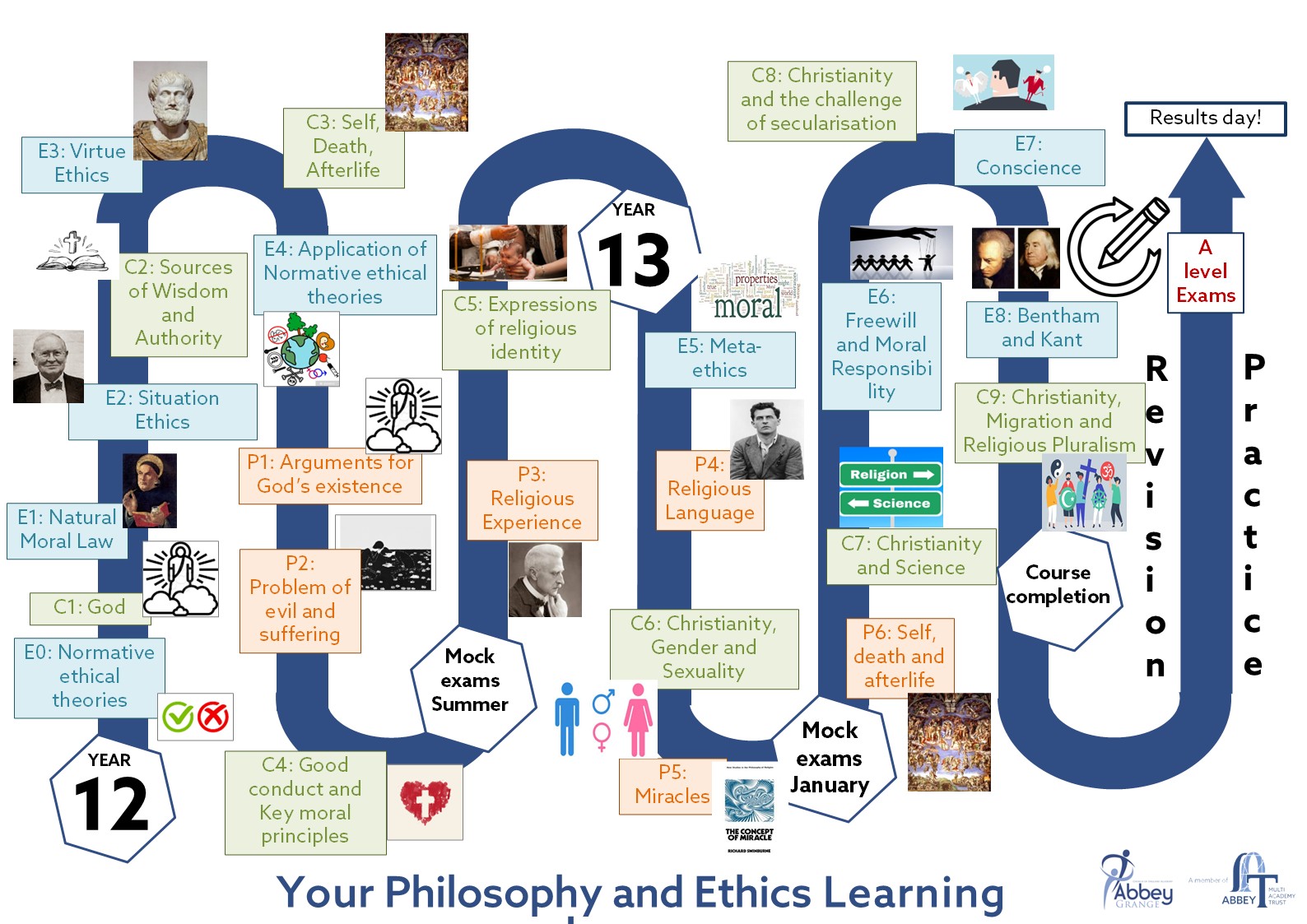
The Religious Studies vision is guided through a belief that understanding others, we understand ourselves. Our curriculum allows students to reflect on the complexity and diversity of Christianity and other world religions to enhance their own relationship with faith and aspire to excellence through academic rigour.


Students will learn about all 6 major religions throughout KS3 RS at Abbey Grange- Christianity, Judaism, Islam, Hinduism, Buddhism and Sikh. Students will be encouraged through the different lenses in Religious Studies- Theology, Sociology and Philosophy, to think deeply about the core beliefs of each religion, and the impact they have on the lives of a believer. 50% of the KS3 curriculum focuses on Christianity, to enable students to have a rich understanding of the complexity of Christian belief. All students will have opportunities to develop their oracy and reading skills, through discussions on religious ideas, and reading around key religious texts.
The ABBEY character is central to our KS3 Religious Studies curriculum. We promote aspiration within our students through the academic rigour of the analysis of beliefs from all 6 major religions, which also allows our students to reflect upon their own religious beliefs and spirituality.
We aim to promote an empathetic understanding of different religious beliefs and worldviews, and in doing so, show benevolence to believers of all backgrounds. Through applying the different lenses of Religious Studies scholars, students will be consistently encouraged to strive to excellence.
Abbey Grange students learn the importance of celebrating and valuing the diversity of culture and belief in the world, and in our academy, accomplishing the core of our intent as a subject- understanding others to help us understand ourselves, becoming young leaders in the process.
Students will have a main assessment at the end of each topic, roughly once per half term. They will have an end of year assessment, which will replace one end of topic assessment and will cover all their knowledge from the key stage so far. All assessments will have an iterative component.
Students are required to take Religious Studies at GCSE, to develop our student’s understanding of other beliefs, and their appreciation of their own. GCSE Religious Studies will continue to improve the skills that students have been using in KS3, and challenge themselves on more in-depth concepts in Christianity, Islam, Philosophy and Ethics.
Students will engage in an in-depth study of both Christianity and Islam looking at the central beliefs and practices that underpin each religion. They will be encouraged to show how religious beliefs influence the actions of the believers and to actively engage with and interpret scripture in order to gain a greater understanding of the basis of these faiths.
Students will then use this theological knowledge as a basis upon which to look at key ethical issues concerning relationships and families, religion and life, and crime and punishment. They will also tackle philosophical ideas surrounding the existence of God and revelation.
Together, this learning helps students to achieve our stated aim of understanding others and understanding ourselves as well as being able to achieve in the GCSE RS exam.
Students will engage in discussions and debates to explore their ideas across the GCSE, contributing to their development as a confident speaker. They will improve as a reader through the unpacking of religious writings and texts.
Through the study of Christian and Muslim beliefs and different philosophical and ethical issues in GCSE Religious Studies, we expect all students to show aspiration in achieving the best grade they can. Students will also be given the opportunity to develop their understanding of religious belief, and as such reflect on their own worldview.
Our curriculum is centred around reading, comprehending and discussing key texts and information, promoting excellence in our students reading and oracy skills, and developing their young leadership.
A key part of understanding the practices of religious believers is to develop an empathetic appreciation of the differences and diversity of our world and school community. As a result, our curriculum encourages the development of benevolence towards people of all backgrounds, and a celebration of the variety of identity in God’s world. This is due to our main intent in Religious Studies- understanding others allows us to understand ourselves.
After each topic, students will complete an assessment that is at minimum a quarter of a GCSE paper. Each assessment will assess students on their religious understanding, their application of scripture, and their skills of evaluation, interpretation and analysis. All assessments will prepare students for the types of questions they will encounter in their final exams, and they will be supported in their preceding lessons with a rubric for each question type. All assessments will have an iterative component.
Students will have two 1 hour 45 minute exams at the end of year 11.
GCSE Religious Studies provides a strong foundation for A-Level Religious Studies (Philosophy and Ethics), as well as a variety of other subjects within the humanities, such as Sociology, Psychology, Law, Criminology, English, History and Geography.
Through studying a variety of different religious beliefs, and ethical issues, students will develop transferable skills that can apply to a wide range of career opportunities, particularly those involving working with other people. These skills include critical and analytical thinking, empathy, communication and a developed cultural awareness.

A-Level Religious Studies is built around three main components of Philosophy, Ethics and Christianity. Within Philosophy, students will be challenged to explore a wide range of diverse views on God’s existence, religious experiences, how we understand religious language, the soul and the afterlife. Ethics looks at key ethical approaches and applies them to moral issues surrounding human and non-human life and death, as well as challenging students to consider how ideas like free will and the conscience affect our ethical thinking.
In Christianity, students will engage with a wide range of theological ideas, from the nature of God and key Christian principles to the relationship of Christianity with secularisation, gender and science. Students will also gain an understanding of how to synthesise these ideas through looking at the dialogue between Christianity, Philosophy and Ethics.
Students will be challenged as readers as they engage regularly in high-level philosophical and theological texts, both in lessons and through their Consolidate, Practice, Extend work. Through the debates and discussions, the subject naturally lends itself too, students will find themselves developing into confident speakers who can clearly make their arguments and defend them.
Religious Studies at A-Level allows all students to aspire to excellence in the in-depth study of Philosophy, Ethics and Theology, as students will be consistently challenged through unique and difficult texts to read, and concepts to debate.
Religious Studies students will develop their own unique insight into the nature of religious belief and reflect on their own beliefs because of this. Their study of ethics complements benevolence, through an appreciation of how other people should be treated.
Students will show leadership in their contribution to debates and discussions, and through the development of their oracy skills, shall become excellent youth leaders.
Students will be assessed at the end of each topic with a minimum of a quarter of an A-Level exam paper. Each assessment will test their knowledge and understanding of the content, as well as their evaluation and critical analysis, in keeping with the AQA assessment criteria. These assessments will be thoroughly marked by teachers, with specific feedback provided. Students will receive a rubric for each exam type at the start of the year, which will support them in their preparation for assessments, alongside their Consolidate, Practice, Extend work.
Students will sit two 3 hour exams at the end of year 13.
Religious Studies is a perfect subject for anyone wishing to explore the humanities at degree level, and the philosophical element provides key skills for anyone wishing to persue STEM subjects. Student of A-Level Religious Studies will develop empathy, cultural awareness, critical and analytic skills, making them an ideal candidate for any career involving interacting with people. Past students have gone on to study PPE, Politics, Law, Theology, Physics and Philosophy, History, Psychology and many more!